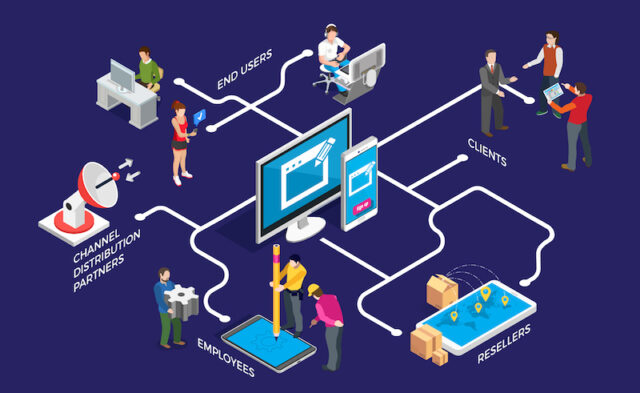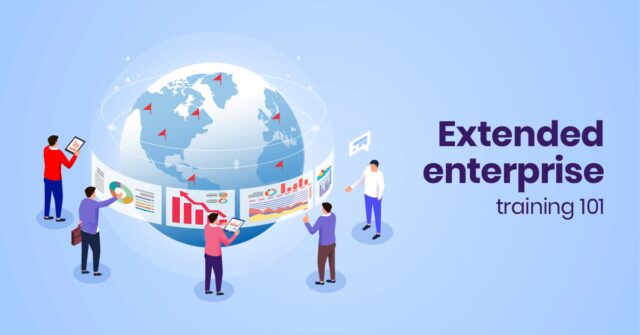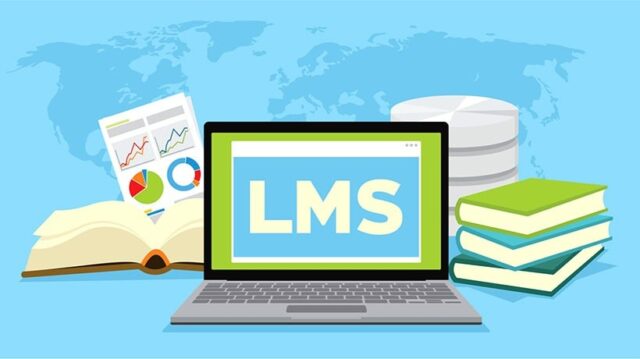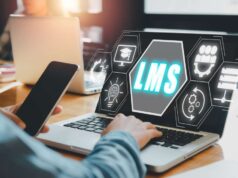
In today’s dynamic and competitive business environment, more is needed for companies to rely on their staff to drive expansion. If they want to grow their company and achieve their objectives, they’ll also need help from across the company. Businesses that want to increase sales and revenue quickly must invest in training their channel partners and end users. Therefore, businesses must install extended corporate LMS to train their external partners. A company’s clients, distributors, resellers, and partners can all benefit from an extended enterprise management system, which provides a centralized hub for all training administration and distribution. Customers can quickly develop lasting relationships with businesses that invest in them by providing training and support.
Training programs, such as those provided to consumers and external personnel, aim to induce quantifiable shifts in behavior, perhaps regarding acquiring new knowledge about a product or service. The expanded enterprise LMS makes it simple to train a wide variety of users on a single infrastructure. If a team from outside the firm needs to become certified to work with the company’s product, they can take advantage of the LMS.
Why is extended enterprise training crucial for your business?

Training your extended network of business contacts is an effective way to boost sales and revenue for any company that relies on this type of business interaction. Whether you have a handful of partners or hundreds of thousands of clients, investing in their education should be a vital component of your expansion plan. Providing your customers, partners, associates, and clients with relevant and up-to-date information through training programs like these can benefit your business. Organizational development training for these teams should be a continuous process, not just something they do at the start.
Multiple sectors can get what they need out of an extended enterprise LMS. A retail establishment may need an Enterprise LMS to provide its staff with the necessary training to acquire new abilities and maintain familiarity with evolving industry standards. Workers who are already competent and enthusiastic about their work will become even more productive. But extended enterprise learning management systems are necessary for businesses like accounting software firms to provide initial and continuous training for their partners and customers on how to use the software. Customers given the tools to become experts on the software are in a prime position to spread the word about the program to others. In-depth corporate learning has numerous positive outcomes.
How extended enterprise does LMS help in the organization’s training process?

Training Programs That Are Simple To Design, Deliver, And Manage:
An extended enterprise LMS makes it easy to design, implement, coordinate, and administer your business’s training programs in record time. Further, Enterprise LMS Software may be tailored to the specific requirements of a wide range of customers thanks to its flexible design. The Learning Management System’s capacity to accommodate numerous tenants at once is due to its multi-tenant feature.
Increase Customer Loyalty:
You don’t want your smartwatch or time management app to collect dust in a drawer or on someone’s smartphone’s “unused apps” list. Low levels of user adoption are problematic for any company. Without regular use, consumers are less likely to remember your brand. Customers often refuse to engage with a product because they either need to comprehend its value or cannot think of a practical application. Both problems can benefit from extended enterprise learning. Your most devoted consumers routinely use your goods. Customers will benefit more from your product if you provide in-depth instruction for their organization. Customers will become more familiar with your company and products due to increased usage, increasing the likelihood that they will make a repeat purchase or continue their subscription.
Contributes to the development of a more robust brand:
Employees who have received extensive corporate training on products and services can better represent the company and its offerings to the public, generating greater interest and sales.
Save Money:
The Extended Enterprise LMS eliminates the need for tenants to use incompatible LMS systems. In exchange for the price of a single system, you can obtain unique looks and functions. Additionally, it enables you to have numerous tenants on the same platform at the exact cost, thereby cutting operational expenditures.
Drives revenue:
Training your partners and distributors can increase sales by improving their knowledge of the products they’re offering, and training your consumers can increase your business through word-of-mouth.
Ease Of Management

An EE LMS greatly simplifies e-learning management for corporate partners and end users alike by enabling the organization to offer specific courseware developed per user profile. The reduced number of administration tasks means more time can be devoted from the organization’s team to focus on developing better methods at delivering challenging material while maintaining focus on their core business models under the oversight of one system administrator.
Security Organizations benefit from the single sign-on capability of EE LMS which allows partners to access secure information without having multiple usernames or passwords across partner sites. With integrated login systems, customers won’t have separate usernames/passwords for different courses within the organization’s system.
Challenges of Implementing an Extended Enterprise LMS

When designing an extended enterprise LMS, there are a number of key challenges to be aware of. From complex user management and security issues to data compatibility and integration hurdles, any extended learning platform must provide a reliable and secure system for efficiently sharing information.
Although it is important to provide users with the tools they need in order to effectively learn anything from customer service training to onboarding materials efficiently, it is imperative that sensitive customer data remains secure and compliant with data safety regulations. This can present challenges such as preventing the distribution of customer information outside the scope of the learning program or granting access only to certain specific user groups within an educational offering.
The extended enterprise LMS should also allow different types of users (customers, partners, etc.) to securely collaborate with each other while being tailored according to their roles and preference. This can include engaging features such as chat or video interaction between participants, customizable course/program workflows, personalization options as well as meaningful ways of streamlining eLearning materials. The platform should also be compatible with multiple languages in order to accommodate a wide range of learners from various countries around the world.
Furthermore, integrated reporting capabilities are important for providing effective performance insights on learner progress; analytics helps understand how effective the program is by monitoring learner activity across all platforms in real-time. For example, this may include tracking levels attained in quizzes or games; completion rates for lessons/modules; feedback from completed activities; successes/failures that indicate whether learners need additional support, etc., allowing administrators more visibility into how different forms of training have been taken up by different user groups and so on.
Finally, ease-of-use is essential for creating a successful extended enterprise LMS roadmap: Without proper control over understanding complex processes behind each implementation phase (configuring needs criteria including setting up courses; configuring access per role criterion; setting up facilitator attribution), the product might end up not adequately meeting user needs resulting in poor adoption rates among channel partners which may push back launch date forecasts considerably.
Conclusion
Training your extended staff can help you generate more money if done right. To avoid losing consumers to rivals, you might take preventative measures. However, it might take time to train a wide variety of target groups using a single training platform. That’s why it’s crucial to pick a corporate LMS that meets your current requirements and adapts to new ones as they arise, using the most advanced technology available.












